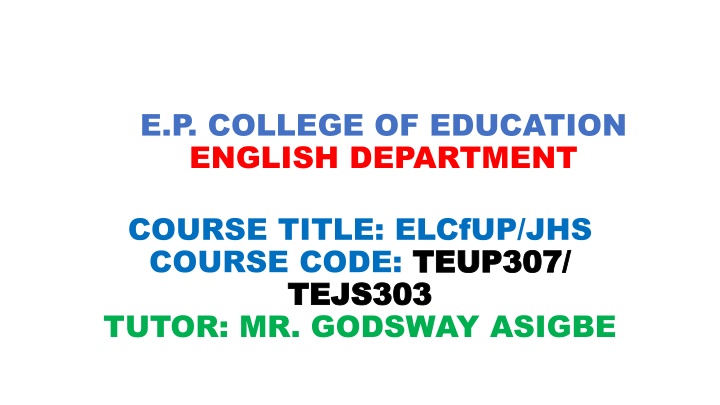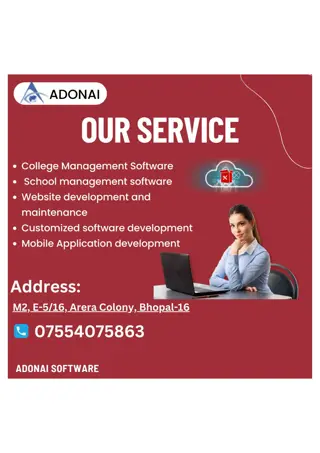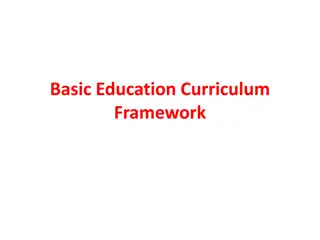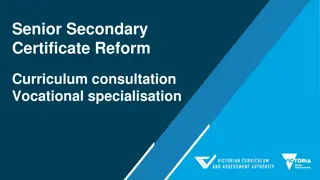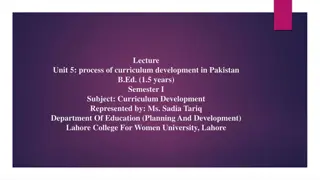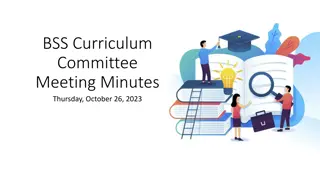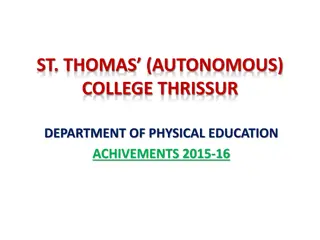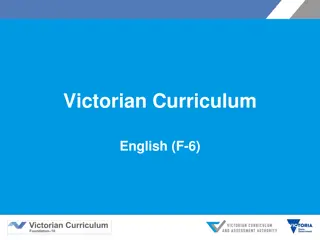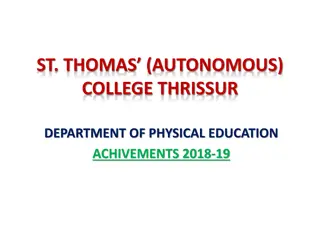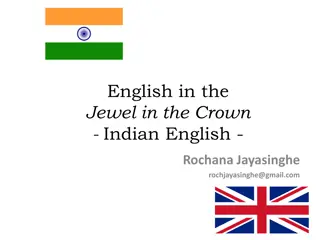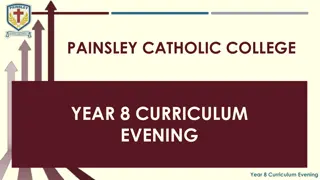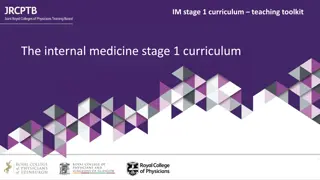E.P. College of Education English Department - Curriculum Overview
Meaning of curriculum, its historical background, distinctions from syllabus, and evolving conceptions. Dive into the dynamic nature of education goals and curriculum development.
Download Presentation

Please find below an Image/Link to download the presentation.
The content on the website is provided AS IS for your information and personal use only. It may not be sold, licensed, or shared on other websites without obtaining consent from the author.If you encounter any issues during the download, it is possible that the publisher has removed the file from their server.
You are allowed to download the files provided on this website for personal or commercial use, subject to the condition that they are used lawfully. All files are the property of their respective owners.
The content on the website is provided AS IS for your information and personal use only. It may not be sold, licensed, or shared on other websites without obtaining consent from the author.
E N D
Presentation Transcript
E.P. COLLEGE OF EDUCATION ENGLISH DEPARTMENT COURSE TITLE: ELCfUP/JHS COURSE CODE: TEUP307/ TEJS303 TEJS303 TUTOR: MR. GODSWAY ASIGBE TEUP307/
Learning Objectives Learning Objectives By the end of this lesson, you should be able to: Define Curriculum Provide brief history of curriculum Define Syllabus Differentiate between curriculum and syllabus
Conceptions of Curriculum Conceptions of Curriculum In In one one sentence explain the meaning of curriculum sentence explain the meaning of curriculum
INTRODUCTION INTRODUCTION Curriculum is an important element of education. Aims of education are reflected in the curriculum. In other words, the curriculum is determined by the aims of life and society. Aims of life and society are subject to constant change. Hence, the aims of education are also subject to change and dynamic. The aims of education are attained by the school knowledge, experiences, activities, skills and values. The different school programmes are jointly known as curriculum. programmes, concerning
Conceptions of Curriculum Conceptions of Curriculum Curriculum has been considered as a new field of study Efforts are being made for: 1. Appropriate definition 2. Ascertaining parameters 3. Seeking a measure of recognition commensurate with its bordering fields of scholarship Every new field has its own conflicting schools of thought
Conceptions of Curriculum Conceptions of Curriculum The concept curriculum has undergone marked changes during the 20thcentury without any consensus on appropriate definition
Conceptions of Curriculum Conceptions of Curriculum Curriculum Curriculum as is historically traced to the Latin word, curere, which means running (Connelly & Lantz, 1991; Tanner & Tanner, 2007). as a a racecourse racecourse: The term Curriculum course or racecourse Curriculum Curriculum as metaphor to describe some notion of a course of events, e.g. school documents, newspaper articles, committee reports, and many academic textbooks. as a a notion notion: At present, it is used as a
Conceptions of Curriculum & Definitions Conceptions of Curriculum & Definitions Sometimes it is narrowly defined to imply a subject of study and another time it is broadly described to include every aspect of an educational set up (Tamakloe, 1992). Portelli (1987) observed that there are more than 120 definitions of the term appearing in the professional literature.
Definitions of Curriculum Definitions of Curriculum A proposed modern definition of curriculum Tanner & Tanner (2007) have proposed a modern definition of curriculum The definition is based on: 1. Progressivist conception of curriculum 2. The interactions of a) the nature of the learner b) the world of knowledge, and c) society Tanner & Tanner based their definition on John Dewey s definition of education.
Definitions of Curriculum Definitions of Curriculum Definition of education by John Dewey: Education Education is that experience experience which experience experience, and which increases ability to , and which increases ability to direct course of subsequent course of subsequent experience experience (1916, pp.89 is that reconstruction reconstruction or reorganisation of which adds adds to the meaning of to the meaning of or reorganisation of direct the 90 the (1916, pp.89- -90
Definitions of Curriculum Definitions of Curriculum Tanner & Tanner s definition of curriculum Curriculum is that reconstruction of knowledge and experience that enables the learner to grow in exercising intelligent control of subsequent knowledge and experience (2007, p.99)
Definitions of Curriculum Definitions of Curriculum Identify three characteristics of Tanner and Tanner definition of curriculum
Definitions of Curriculum Definitions of Curriculum Characteristics of the definition: 1. Curriculum is generative 2. Curriculum is not inert or passive as others define it 3. The definition considers knowledge as dynamic 4. It encompasses not only formal subject matter but also the processes through which the learner becomes increasingly knowledgeable
Definitions of Curriculum Definitions of Curriculum NARROW DIFINITIONS NARROW DIFINITIONS From the narrow perspective, curriculum is seen as: a) The whole body of courses offered in an educational institution or by a department b) b) A course, especially, a specified fixed course of study, in a school or college as one leading to a degree According to Barakett and Cleghern (2000), curriculum refers to the courses or subjects specified by the Ministry of Education that are to be taught at each grade level as well as the amount of time to be devoted to each
NARROW DIFINITIONS OF CURRICULUM NARROW DIFINITIONS OF CURRICULUM McNeil (1985) also refers to curriculum as a course of study to be taught to students in an educational institution
Common Features of Narrow Definitions of Curriculum 1. Curriculum is limited to academic work in the form of subjects or courses to be taught like program of studies. 2. Narrow definitions conceive curriculum as consisting of information recorded in guides and textbook and overlook some additional elements that make learning complete. 3. It equates curriculum with written prescriptions of what is intended to happen in school.
Broad Definitions of Curriculum Curriculum is what goes on in schools and training institutions (Mathew 1989). All learning experiences that learners have in the course of living (Antwi, 2009}
Criticisms of Broad Definition of Curriculum It fails to differentiate between educative and other kinds of experiences (non- educative and mis-educative) that students are exposed to in schools and other training institutions. There is the tendency to bring unintended negative outcomes of schools under curriculum. E.g. drug abuse, teenage pregnancy, the result of peer influence and negative aspect of school socialization. Viewing curriculum as all life experiences of learners makes no distinction between what happens school and what happens in life generally.
Midway Definition of Curriculum From the midway point of view, curriculum is seen as: All planned learning for which the school is responsible (Eisner, 1994). All the experiences that learners have under the guidance of the school (Doll, 1998). All the learning which is planned and guided by the school, whether it is carried on in groups or individually, inside and outside the school. (Kerr, 2002).
Midway Definition of Curriculum A series of planned events that are intended to have educational consequences for one or more students. ( Eisner, 1994) The formal and informal content and process by which learners gain knowledge and understanding, develop skills and alter attitudes, appreciations and values under the auspices of the school (Doll, 1989). A program of selected contents and learning experiences offered by the school and capable of their modifying or changing learners behaviour. The sum total of educationally valuable experiences the learners undergo, under the guidance of the school or other training institution (Adentwi, 2005).
ELEMENTS OF CURRICULUM The school curriculum has four key elements that are in constant interaction. These elements are: 1. Curriculum Aims, Goals and Objectives 2. Curriculum Content or Subject Matter 3. Curriculum Experience or Learning Experience 4. Curriculum Evaluation
Curriculum Aims, Goals and Objectives The purpose of a curriculum: Is based on the social aspirations of society Outlines the goals and aims of the programme and Is expressed as goals and objectives There are three categories of goals and objectives: Cognitive, referring to intellectual tasks Psychomotor, referring to muscular skills and Affective, referring to feeling and emotions.
Curriculum Content or Subject Matter The content of the curriculum: Is divided into bodies of knowledge, for example, management, economics, mathematics, geography, etc Outlines the desired attitudes and values Includes cherished skills Is determined by prevailing theories of knowledge and considerations
Curriculum Experience or Learning Experience/ Methods The methods outlined in a curriculum: deal with teaching and experiences and involve organizational strategies learning
Curriculum Evaluation Evaluation is used to: select appropriate content based on the aims and objectives of the curriculum select appropriate methods to address the content and purpose; check the effectiveness of methods and learning experiences used
Curriculum Evaluation check on the suitability and appropriateness of the curriculum in answering social needs provide feedback to planners, learners, teachers, industry and society provide a rationale for making changes
TYPES OF CURRICULUM 1. Ideological curriculum ideal curriculum construed by scholars and teachers 2. The formal curriculum officially approved curriculum by the state The sanctioned curriculum that represents society s interests 3. The perceived curriculum what stakeholders, e.g. parents, teachers, think it should be 4. The operational curriculum what is actually implemented in the classroom 5. The experiential curriculum what the learners actually experience
TYPES OF CURRICULUM Glatthorn, Boschee & Whitehead (2006) 1. Recommended curriculum the ought-ness (ideological) 2. Written curriculum embodied in approved guides (similar to Goodlad s formal curriculum) 3. Supported curriculum as reflected in and shaped by resources, e.g. time, personnel, textbooks needed to deliver it 4. Taught curriculum the delivered curriculum in action 5. Tested curriculum that set of learnings assessed in teacher-made-tests, district curriculum-referenced tests, standardized tests 6. Learned curriculum changes in values, perceptions & behaviour as a result of school experiences 7. Hidden curriculum or unstudied curriculum or the implicit curriculum curriculum other than the intentional one
Definitions of a syllabus What is syllabus?
GROUP WORK Provide a working definition of: a. Curriculum b. Syllabus c. Discuss the differences between curriculum and syllabus
LECTURE 2&3 Theories and models of curriculum development Objectives: By the end of the lesson, the learner will be able to: 1. Explain what is meant by theory 2. Identify and explain at least two theories of curriculum development 3. Explain what is meant by model 4. Discuss three models of curriculum
Theories and models of curriculum development What is theory? What is model What is curriculum What is development
Theories of Curriculum Development Theories of Curriculum Development To start with, there are two broad categories of philosophy: the traditional and modern philosophies. In each of those categories, there are major philosophies such as idealism, realism, pragmatism, and educational philosophies arising philosophies. These include perennialism and essentialism in the traditional category, while progressivism and reconstructionism fall under the modern philosophies. These educational philosophical approaches are currently used in classrooms the world over. These educational philosophies focus heavily on WHAT we should teach, the curriculum aspect. existentialism, as well as from those major
TRADITIONALIST THEORY (PHLOSOPHY )OF CURRICUM TRADITIONALIST THEORY (PHLOSOPHY )OF CURRICUM The traditionalist is a perennialist, essentialist or critical humanist 1. Curriculum as a subject-matter content 2. Curriculum as the cumulative tradition of organised knowledge 3. Curriculum as disciplinary knowledge 4. Curriculum as an instructional plan of course of study 5. Curriculum as measured instructional outcomes (products) technological production model 6. Curriculum as cultural reproduction
Curriculum as a subject-matter curriculum The traditionalist: That curriculum is organised as subjects The professional educator: 1. Curriculum is designed beyond subjects 2. Curriculum can be correlated 3. Curriculum can be organised as interdisciplinary units of work or as problems and themes integrating several subjects, broad fields, or combined fields of study 4. Curriculum as projects and activities beyond given subjects
TRADITIONALIST THEORY (PHLOSOPHY )OF CURRICUM TRADITIONALIST THEORY (PHLOSOPHY )OF CURRICUM Curriculum as the cumulative tradition of organised knowledge Traditionalist: that the organised knowledge of the cumulative tradition must be impacted to each rising generation To them knowledge is truth and truth is universal Education is must therefore be universal This conception devalues the dynamic nature of knowledge, the modern scientific studies and the practical application of knowledge
TRADITIONALIST THEORY (PHLOSOPHY )OF CURRICUM TRADITIONALIST THEORY (PHLOSOPHY )OF CURRICUM Curriculum as disciplinary knowledge This belief comes from the doctrine of structure-of-the-discipline (Jerome Bruner) That constituent academic disciplines such as in the sciences and mathematics are each built on a structure that reveals how the knowledge is related within the discipline That the structure of the discipline is embodied by the fundamental ideas, concepts and generalisations that define the discipline The curriculum of a subject is therefore be determined by the most fundamental understanding that can be achieved of the underlying principles that give structure to that subject
TRADITIONALIST THEORY (PHLOSOPHY )OF CURRICUM TRADITIONALIST THEORY (PHLOSOPHY )OF CURRICUM Curriculum as an instructional plan of course of study That curriculum is an instructional plan That it is a course of study That curriculum is discovery or inquiry oriented However, the inquiry was directed at specialised disciplinary knowledge to the deliberate exclusion of practical knowledge geared to the learner s development and life experience, and to the wider social situation. Again, the curriculum, though considered inquiry based, was more of teacher proof, a contradiction in terms
TRADITIONALIST THEORY (PHLOSOPHY )OF CURRICUM TRADITIONALIST THEORY (PHLOSOPHY )OF CURRICUM Curriculum as measured instructional outcomes (products): A technological production model That curriculum must be conceived in terms of test results. Curriculum is seen as a quantitatively measured outcomes of instruction The concept originated from the concept of the application of industrial scientific management (industrial plant management) to education Measure the curriculum according to input (the entering pupil) and the output (the departing pupil) This conception of curriculum forces teachers to teach to the test.
TRADITIONALIST THEORY (PHLOSOPHY )OF CURRICUM TRADITIONALIST THEORY (PHLOSOPHY )OF CURRICUM Curriculum as cultural reproduction Cultural reproduction is basically a selection of studies or subject matters designed to maintain the existing social order
PROGRESSIVIST THEORY (PHILOSOPHY OF CURRICULUM PROGRESSIVIST THEORY (PHILOSOPHY OF CURRICULUM There was a drastic change in the conception of curriculum the early part of 20thcentury Reasons: 1. Changes in the conception of scientific knowledge 2. Changes in the knowledge of learning process as a result of the child centred movement 3. The need to link formal school studies with the life of the learner and the changing demands of the larger social scene
PROGRESSIVIST THEORY (PHILOSOPHY OF CURRICULUM PROGRESSIVIST THEORY (PHILOSOPHY OF CURRICULUM On the basis of the above, progressivists conceived: Curriculum as knowledge selection/organisation from the experience of the culture Curriculum as modes of thought Curriculum as experience Curriculum as guided learning experience Curriculum as guided living: The planned learning environment in action
PROGRESSIVIST THEORY (PHILOSOPHY OF CURRICULUM PROGRESSIVIST THEORY (PHILOSOPHY OF CURRICULUM Curriculum as knowledge selection/organisation from the experience of the culture This is more like the curriculum as a cumulative tradition of knowledge However, this concept looks at the total culture of a society. The importance of transferring and reconstructing the cultural experience through the curriculum
PROGRESSIVIST THEORY (PHILOSOPHY OF CURRICULUM PROGRESSIVIST THEORY (PHILOSOPHY OF CURRICULUM Curriculum as modes of thought The focus of curriculum as modes of thought is reflective thinking That learning is learning to think That curriculum elements are unified through reflective thinking Reflective thinking is about problem solving through systematic steps
PROGRESSIVIST THEORY (PHILOSOPHY OF CURRICULUM PROGRESSIVIST THEORY (PHILOSOPHY OF CURRICULUM Curriculum as experience That the curriculum serves to develop the child s present experience to a richer maturity That the scheme of a curriculum must take account of the adaptation of studies to the needs of existing community life It must select with the intention of improving the life we live in common so that the future shall be better than the past.
PROGRESSIVIST THEORY (PHILOSOPHY OF CURRICULUM PROGRESSIVIST THEORY (PHILOSOPHY OF CURRICULUM Curriculum as guided learning experience Than the school as a learning-living environment is very crucial That curriculum should embody all the learning experiences provided the learner under the guidance of the school That the curriculum should be seen as the total experience with which the school deals in educating young people
PROGRESSIVIST THEORY (PHILOSOPHY OF CURRICULUM PROGRESSIVIST THEORY (PHILOSOPHY OF CURRICULUM The curriculum as guided living: The planned learning environment in action This conception of curriculum is vocationally inclined That the curriculum should be the very stream of dynamic activities that constitute the life of young people and their elders
PROGRESSIVIST THEORY (PHILOSOPHY OF CURRICULUM PROGRESSIVIST THEORY (PHILOSOPHY OF CURRICULUM Progressivists education seeks to promote democratic schooling as well as social living. The other major emphasis is on a child or learner centred curriculum. The curriculum therefore is based on the learners interests, needs, abilities and aspirations, among other characteristics of the learners.
PROGRESSIVIST THEORY ( PROGRESSIVIST THEORY (PHILOSOPHY) PHILOSOPHY) OF CURRICULUM OF CURRICULUM Progressive education curriculum emphasized five approaches to the teaching/learning process, namely:- Teacher pupil planning of curriculum activities Flexible curriculum and individualized instruction Learner-centred teaching and learning methodology Selection of study material in line with the expressed interests and concerns of the learner Non formal curriculum activities and physical training in areas like games, related hobbies and other co-curricular areas.
